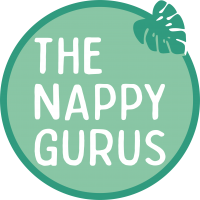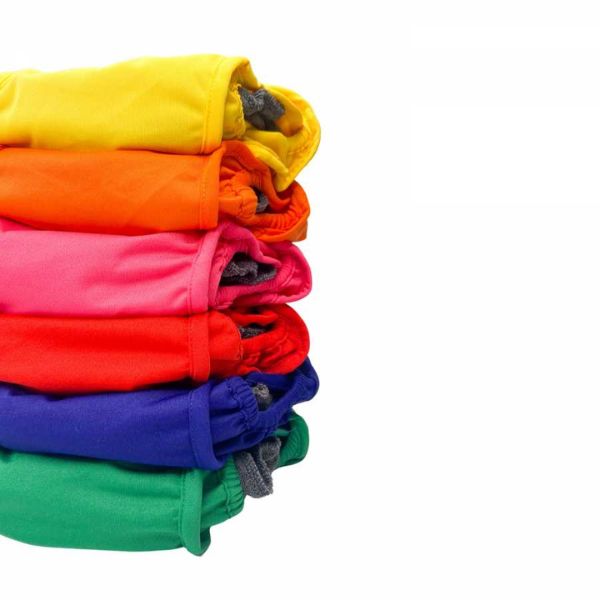Avoid Plastic Waste While Travelling With Babies
How to avoid plastic waste when travelling with babies
The summer holidays have finally arrived, which means thousands of families are set to jet off to their favourite destinations for a well-deserved break. While people should be excited to spend some time in the sun, families must consider their environmental impact when travelling, especially with babies. This is even more vital with the recent heatwave that swept across the UK, highlighting a real need for action against climate change.
Following a 400% increase in searches for ‘plastic free travel’ in the past 12 months¹, our team of eco experts delve into ways families can avoid plastic waste when travelling with babies:
1. Reusable nappies
Plastic makes up 30% of a single-use nappy, which equates to 9.55g of plastic waste², whereas reusable nappies are made from either cotton, bamboo, hemp or microfibre. On average, parents could use up to 50 disposable nappies on their baby every week, but this could increase further on holiday, especially with warmer weather and changes in food possibly affecting bowel movements.
Switching to reusable nappies is a great way to cut down on plastic waste not only on holiday but at home. Reusable cloth nappies can reduce a family's carbon footprint by 40%³ and could halve the weekly rubbish generated on summer breaks abroad.
2. Reusable wipes
Nine in ten (90%) disposable wipes on supermarket shelves are made up of plastic⁴, including baby wipes. Mainstream wipes are manufactured to create a soft yet durable texture, and a plastic resin is used to achieve this. Plastic can never fully biodegrade and can only be broken down into smaller pieces. So, when parents use disposable wipes on holiday near the beach, the environment will be exposed to thousands of microplastics.
Reusable wipes are great alternatives to disposables. Cloth wipes take up little room in a suitcase, they can be easily washed using hotel laundry services, or if the wipes haven’t been soiled, they can be washed in the bathroom sink using cold water.
3. Reusable food pouches
Reusable baby food pouches are an easy and convenient way to feed your little one on the go. Using food pouches like this is a great way to avoid buying meals for your baby in plastic food packaging from supermarkets or hotel shops. It also gives the benefit of knowing exactly what’s inside of them and ensuring your baby maintains good nutrition, even in another country.
Reusable pouches are perfect on holiday if you’re considering bringing pre-made baby food from home or you plan on buying food to prep in your hotel room whilst you’re away.
4. Silicone cups and straws
Plastic cups and straws are significant contributors to the world's plastic waste. Over 8.3 billion plastic straws are polluting the beaches⁵ of the UK's favourite holiday destinations. Families travelling with babies might find their cup and straw usage increases on holiday due to consuming more fluids to keep hydrated and cool.
Carrying reusable silicone cups and straws in your beach bag is a great way to avoid contributing to plastic waste by the seaside, and you can ask for cups to be refilled using the hotel's filtrated water supply⁶.
5. Reusable bottles
Every minute that passes the globe goes through one million plastic water bottles⁵. This stark figure is a reminder of how reusable water bottles are one of the best eco-friendly investments and make excellent travel companions for babies, children, and the entire family. Reusable water bottles are also great to carry in hand luggage while travelling through airports.
According to a recent report, 72% of people worldwide believe sustainable travel is important⁷. This figure reinforces the need for families to be informed about how eco-friendly travel can be implemented using easy and realistic swaps.
Travelling sustainably
Families need to make sustainable swaps in their everyday lives, and it's essential that this is continued when travelling. From plastic bags to disposable water bottles, and disposable nappies to throw away wipes, these waste items increase exponentially when heading on holiday, and families should look to decrease the usage of these items.
Other things to consider when trying to travel sustainably are calculating the carbon footprint of your family trip and offsetting this when you get home, packing lighter to contribute to planes using less fuel, buying fewer clothes, and choosing a green country to travel to.
At The Nappy Gurus, we’re not only eager to promote the use of reusable baby products, like reusable wipes and nappies, but all eco-friendly products and behaviours that families can utilise to contribute to a greener lifestyle. To learn more about our reusable baby products, please visit: https://www.thenappygurus.com/help.html
Sources
- Search volume insight for the term ‘plastic free travel’ correct as of July 2022
- North Yorkshire County Council
- The Nappy Gurus
- BBC News
- Condor Ferries
- Not all hotels abroad have clean water supplies available. Nappy Gurus recommend checking with the hotel reception before drinking water from taps.
- Statista
For more insights and tips from our experts, head over to our nappy blog page, including blogs such as:
- 5 Reasons to Choose to Reuse
- Everything You Need to Know About Swim Nappies
- How to Become a Greener Parent
- Is Baby Wearing Good for Babies?


